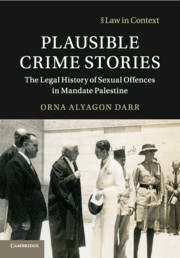Book contents
- Plausible Crime Stories
- The Law in Context Series
- Plausible Crime Stories
- Copyright page
- Dedication
- Contents
- Acknowledgements
- Introduction
- 1 Legal Background
- 2 Cultural Narratives Underlying Proof: Male-to-Male Offences
- 3 Plausibility of Children’s Testimonies: Narrator’s Identity
- 4 Plausibility and Ethnicity: Audience–Narrator Nexus
- 5 Plausible Emotions
- 6 Corroboration: Plausibility Embedded in Evidentiary Standards
- 7 Implausible Counter-Narratives
- Conclusion
- List of Legal Cases
- Appendix Relevant Criminal Legislation
- Bibliography
- Index
2 - Cultural Narratives Underlying Proof: Male-to-Male Offences
Published online by Cambridge University Press: 20 November 2018
- Plausible Crime Stories
- The Law in Context Series
- Plausible Crime Stories
- Copyright page
- Dedication
- Contents
- Acknowledgements
- Introduction
- 1 Legal Background
- 2 Cultural Narratives Underlying Proof: Male-to-Male Offences
- 3 Plausibility of Children’s Testimonies: Narrator’s Identity
- 4 Plausibility and Ethnicity: Audience–Narrator Nexus
- 5 Plausible Emotions
- 6 Corroboration: Plausibility Embedded in Evidentiary Standards
- 7 Implausible Counter-Narratives
- Conclusion
- List of Legal Cases
- Appendix Relevant Criminal Legislation
- Bibliography
- Index
Summary
- Type
- Chapter
- Information
- Plausible Crime StoriesThe Legal History of Sexual Offences in Mandate Palestine, pp. 30 - 49Publisher: Cambridge University PressPrint publication year: 2018



